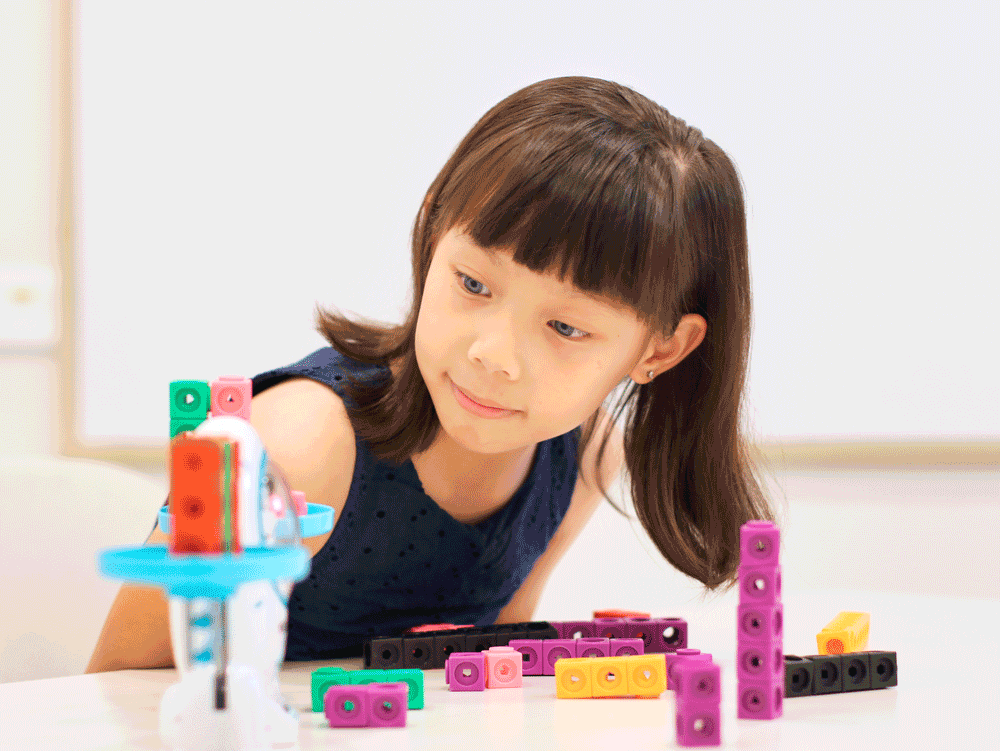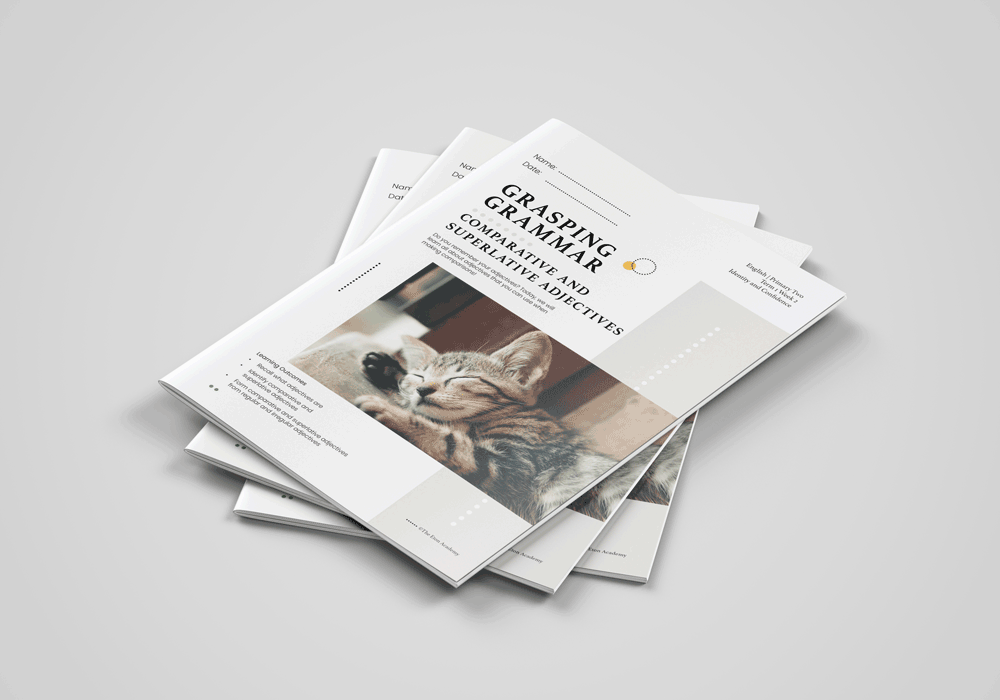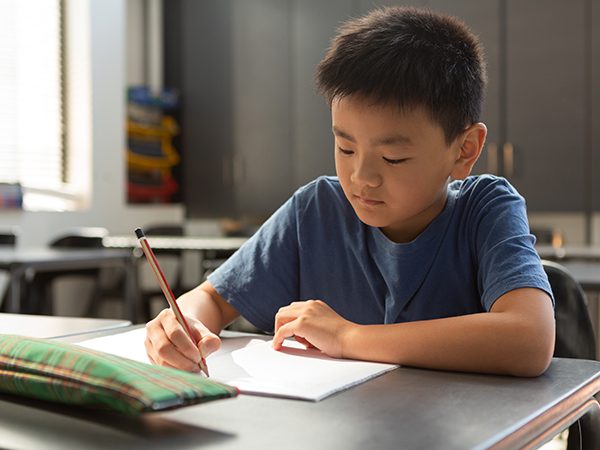Primary 2
Programmes for Primary 2
It is crucial that your child has the right foundation in Primary 2 as Primary 3 is a year in which students will experience a shift to more rigorous academic learning.
To ensure that your child is sufficiently stretched in class and gains a deeper understanding of the MOE Primary 2 syllabus, we have structured our English & Math tuition lessons to integrate investigative learning, content mastery practices, class discussions and extended learning activities to help your child hone his or her language, numeracy and problem-solving skills.
Class Duration: 1 hour 45 mins
Class Size: Maximum 12 students
Check out our Young Explorer Camps held during the school holidays, where we explore science and aviation!

Tuition Classes for Primary 2 (English & Mathematics)

Primary 2 English
-
WRITE ON!
Students develop the essential skills of writing, reading comprehension, vocabulary acquisition as well as proficiency in grammar rules.
Your child will learn how to model his or her own writing after authors’ use of writing techniques, and build a repertoire of writing strategies to utilise in compositions and other forms of writing. -
RAISING READERS
We incorporate passages taken from literary works and non-fiction into our curriculum, exposing your child to different text types while honing his or her reading comprehension skills.
-
GETTING GRAMMAR RIGHT
We help students build a strong language foundation through a variety of language exercises that help to reinforce grammar rules.
-
BE HEARD
We encourage your child to be an active listener and an articulate speaker, developing his or her own voice and perspective.
-
BE CURIOUS
Weekly exploratory themes and mini projects are introduced to help your child develop oral communication and critical thinking skills.
Themes and Language Skills
Through the course of our P2 English programme, your child can look forward to learning the following:
- Creative writing of different text types (e.g. letters)
- Generating plotlines based on given themes and pictures
- Structuring a narrative story to include a conflict and resolution
- Applying basic writing techniques such as descriptions using sensory language
- Reading comprehension and cloze passages which cover a range of themes and are rich in vocabulary
- Question analysis of key terms
- Location of clues in the passage to answer questions
- Construction of relevant answers to open-ended questions
- Grammar topics such as subject-verb agreement, continuous tense, expressions of future time and sentence synthesis
- In-class discussions and presentations
- Mini projects and exhibitions for students to present what they have learnt
- Some themes covered during the academic year include:
- Sustainability
- School and Learning
- Discoveries and Inventions
- Communicating with Others
Assessment Framework for Primary 2 English Tuition
Throughout the academic term, there will be informal classroom assessments conducted to better guide and boost each student’s learning journey.
-
Application of Writing Techniques
Written exercises in which children demonstrate proficiency in application of writing techniques (e.g., character descriptions and story structure) are conducted throughout the term. Compositions are assessed using rubrics aligned with local school requirements.
-
Application of Grammar Concepts
Written tasks that require children to recall and apply their understanding of grammar concepts taught in the prior weeks and for teachers to track children’s mastery of the concepts are conducted weekly. Examples of tasks include multiple-choice questions, sentence construction or cloze passages.
-
Oral Communication
Children are evaluated on their clarity of expression and organisation of ideas once a term using rubrics aligned with local school requirements.
-
Language Review
Children recall and apply what they have learnt by completing a review paper comprising various language tasks such as multiple-choice questions, sentence synthesis, cloze passages and comprehension open-ended exercises. Teachers use the performance of the children in each section of the paper to determine areas of improvement for each child.
At the end of each term, learning snapshots are also distributed to students and parents on the following:
General Behaviour, Attitudes and Dispositions
- Children’s traits are evaluated based on general classroom observations throughout the term. Children are assessed to be either developing, proficient or exceptional in the various areas.
Proficiency in Reading, Writing and Speaking
- Children’s mastery of reading, writing and speaking skills based on performance in classroom activities and written tasks are evaluated and recorded. Children are assessed to be either developing, proficient or exceptional in the various areas such as application of answering techniques, accuracy of sentences and originality of ideas, as well as confidence and fluency in expression of personal thoughts and opinions.

Primary 2 Mathematics
-
UNDERSTANDING MATHS IN THE REAL WORLD
Weekly investigative problems help your child to see how maths applies in real-world situations and are used to familiarise your child with problem-solving heuristics.
-
ENGAGING IN HANDS-ON LEARNING
Lessons use manipulatives, interactive activities and class projects to give students a fun learning experience.
-
USING HEURISTICS
Your child will learn different methods aligned with the MOE syllabus to tackle problem sums.
-
REGULAR REVIEW
Ensure your child gets the most out of each lesson through our three-pronged Readiness-Engagement-Mastery approach.
Hone your child’s metacognitive skills and enable your child to monitor his or her own learning via mastery checkpoints in the form of fun puzzles, short quizzes or activities. -
BE CHALLENGED
Stretch activities, which include more challenging problems to topics introduced in class, help your child to explore math concepts on a deeper level.
Concepts and Skills
Some maths concepts and skills that your child can look forward to in our P2 Mathematics programme include:
- Numbers and Algebra
- Numbers up to 1000
- Addition and subtraction within 100
- Times tables of 2, 3, 4, 5 and 10
- Multiplication and division of whole numbers
- Fractions
- Special numbers
- Number facts
- Measurement and Geometry
- Time
- Length
- Mass
- Volume
- Money
- Two-dimensional and three-dimensional figures
- Statistics
- Picture graphs with scales
- Draw a model
- Part-whole model
- Comparison model in 2-step word problems
- Guess and check
- Guess-and-check table
- Make a systematic list
- Branching
Assessment Framework for Primary 2 Math Tuition
The assessment framework and review are based on the Singapore MOE Primary Mathematics syllabus with clear curriculum learning outcomes. At The Eton Academy, there are weekly learning outcomes, summative assessments and formative assessments:
Summative Assessments
- Learning Snapshots: Assesses learning disposition and attainment levels of learning outcomes from first 8 weeks of term, given out during week 10
- Term Review: Assesses application of learning outcomes from the past in a formal assessment setting at the end of the term
Formative Assessments
- Lesson Review: Weekly assessment of this week’s learning outcomes at the end of the week’s lesson
- Mental Mathematics: Weekly assessment of past learning outcomes required for success in the week’s lesson
- Homework: Weekly assessment of student’s ability to apply concepts independently

